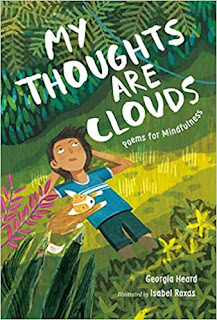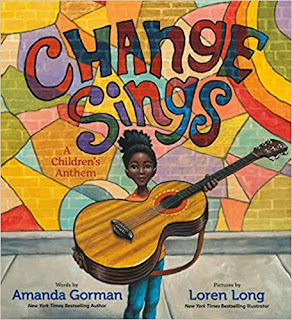*** This post is a reprint of a guest blog I wrote for the Cardinal Rule Press Blog. ***
As a teacher and children’s writer, I herald the power of poetry to boost literacy. I think of poetry as “literacy’s superfood.” It’s packed with rich vocabulary and literary devices in a concise format. Poetry is perfect for educators and parents who are short on time but want to provide bountiful content. Because poetry says a lot in a few words, it is accessible to a wide range of readers, including English language learners and those struggling with learning difficulties.
* Using the poem “My Inner Weather Report” as a springboard, invite kids to create their own daily “inner weather report” to tune into their emotions.
* Read the poem “Nature Walk” and then take a mindful walk outside. Encourage kids to notice sights, sounds, smells, and textures.
* Create a “Better World” theme of the week, centered on each word from the book. Use the accompanying poem, quote, and anecdote to spark conversations about what it means to enact each word.
* Share the list of questions that accompany the final poem in the book, including “What is the problem?” “Why do I care?” and “What adults or groups can support me?” Brainstorm current issues and ways kids can spark change.
When Amanda Gorman shared her stunning poem “The Hill We Climb” at the inauguration of President Joe Biden, she opened the nation’s eyes to the power of poetry to inspire hope and cultivate a sense of purpose. In her lyrical picture book Change Sings, Amanda Gordan invites readers to use their own unique gifts to spark change. From cleaning up a littered playground to building a ramp for a child in a wheelchair, the children in Change Sings demonstrate the ripple effect of positive social action. There are some wonderful ideas for using Change Sings to inspire young change-makers in this educator’s guide developed by the publisher.
Lately, I’ve noted another benefit of this superfood: poetry helps support social-emotional learning. Poems challenge readers to step into a moment and consider a fresh perspective. As a result, poems nurture awareness and empathy. They also empower kids to believe their words and actions can make a difference. Here are some recent poetry picture books that are wonderful tools for inspiriting kind, mindful, change-making attitudes and behaviors.
My Thoughts are Clouds: Poems for Mindfulness, written by Georgia Heard, illustrated by Isabel Roxas, and published by Roaring Brook Press.
Much research has been done on how mindfulness helps individuals become more centered, calm, and caring. In My Thoughts are Clouds, Georgia Heard introduces young readers to the practice of being mindful through 30 engaging poems. The poems explore everything from breathing deeply to cultivate tenderness. Here are some ideas for using My Thoughts are Clouds to help kids explore their feelings and turn their thoughts toward kindness:
* Start each day with a “moment of mindfulness.” Invite kids to sit quietly and comfortably while you share a poem from the book. Then provide a few minutes of quiet reflection and deep breathing before discussing what thoughts and feelings the poem evoked.
* Using the poem “My Inner Weather Report” as a springboard, invite kids to create their own daily “inner weather report” to tune into their emotions.
* Read the poem “Nature Walk” and then take a mindful walk outside. Encourage kids to notice sights, sounds, smells, and textures.
Dictionary for a Better World: Poems, Quotes, and Anecdotes from A to Z, written by Irene Latham and Charles Waters, illustrated by Mehrdokht Amini, and published by Carolrhoda Books.
Dictionary for a Better World includes 48 poems, arranged alphabetically by words that relate to creating a better world, such as acceptance, empathy, and upstander. Along with a poem, each entry includes a quote from an inspiring person, a personal anecdote from the authors, and an invitation for the reader to "try it" and engage in an activity related to the word. Each poem also models a specific poetic structure- like haiku, cinquain, and etheree. Here are some ways to use Dictionary for a Better World to encourage empathetic upstanders all year long:
* Create a “Better World” theme of the week, centered on each word from the book. Use the accompanying poem, quote, and anecdote to spark conversations about what it means to enact each word.
* Challenge kids to do the “try it” activity over the week and report back.
* Using each poem as a model for format, have kids write their “Better World” poems. Encourage kids to explore what the “Better World” word of the week means to them.
No Voice Too Small: Fourteen Young Americans Making History, edited by Lindsay H. Metcalf, Keila V. Dawson, and Jeanette Bradley; illustrated by Jeanette Bradley, and published by Charlesbridge.
No Voice Too Small introduces fourteen young activists who made a real difference in the world, from Mari Copeny, who demanded clean water in Flint Michigan to Viridiana Sanchez Santos, who demonstrated against anti-immigrant policies. Each activist is highlighted in a poem written by a poet who relates to an aspect of the activist’s identity. Use No Voice Too Small to help readers amplify their own voices with these ideas:
* Share the list of questions that accompany the final poem in the book, including “What is the problem?” “Why do I care?” and “What adults or groups can support me?” Brainstorm current issues and ways kids can spark change.
* Choose a poetry format featured in the book. Challenge students to imitate the format and write a poem about a problem they would like to solve.
Kindness is a Kite String: The Uplifting Power of Empathy, written by Michelle Schaub, illustrated by Claire LaForte, and published by Cardinal Rule Press.
Kindness is a Kite String, a picture book in verse, celebrates how simple acts of kindness can change lives and connect others. The book begins the words, “Kindness is like sunshine, it starts the day off right” and shows a child hugging his mom. This starts a wave of kindness that ripples through the community, linking diverse groups of people. As readers follow the story, they gather ideas for ways they can lift others with kindness. Each action in Kindness is a Kite String is described using a relatable simile or metaphor. Here are some ideas for using Kindness is a Kite String to spread kindness:
* Use the discussion prompts at the beginning of book to help kids think more deeply about why kindness matters.
* Download the free Readers Guide which includes printable kindness certificates and a kindness journal.
* Encourage kids to log their empathetic actions in the journal. Award kindness certificates when kids are caught being kind.
* Review the concept of similes and metaphors with the help of the authors notes at the end of the book. Then brainstorm other similes and metaphors for kindness. Ask “What are some activities or things that you enjoy?” Guide kids to think about how those things are like kindness. For example, kindness is like a bowl of popcorn because it’s meant to be shared. (For a complete lesson on using Kindness is a Kite String to write kindness poems, click HERE.)
Change Sings: A Children’s Anthem by Amanda Gorman, illustrated by Loren Long, published by Viking Books.
When Amanda Gorman shared her stunning poem “The Hill We Climb” at the inauguration of President Joe Biden, she opened the nation’s eyes to the power of poetry to inspire hope and cultivate a sense of purpose. In her lyrical picture book Change Sings, Amanda Gordan invites readers to use their own unique gifts to spark change. From cleaning up a littered playground to building a ramp for a child in a wheelchair, the children in Change Sings demonstrate the ripple effect of positive social action. There are some wonderful ideas for using Change Sings to inspire young change-makers in this educator’s guide developed by the publisher.
Wishing you a year filled with poetry, mindfulness, and kindness!







Comments
Post a Comment